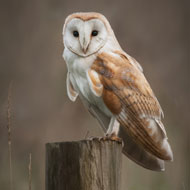Barn owls ‘have ageless ears’

"Evolution has favoured birds to benefit from regeneration in the inner ear that is absent in mammals," - Dr Ulrike Langemann.
Fresh insights into the preservation of hearing in birds may one day lead to new treatments for hearing loss in humans.
Researchers at the University of Oldenburg, Germany, found that barn owls ‘have ageless ears’. This means that they have the ability, unlike mammals, to regrow hair cells in the inner ear.
The study, published in the journal Proceedings of the Royal Society B, is the second of its kind to return similar results. The first assessed auditory performance in the starling and found their hearing was not affected by age.
Dr Ulrike Langemann, a study researcher from the University of Oldenburg in Germany, told The Mail Online: “Barn owls have ageless ears. Evolution has favoured birds to benefit from regeneration in the inner ear that is absent in mammals. Mammals, including humans, commonly suffer from a serious hearing loss at old age… If we could learn how birds can retain their sensitivity, this may lead to new treatment options for humans.”
She added that by the age of 65, humans will have lost more than 30 decibels in sensitivity at high frequencies. Elderly birds, on the other hand, will experience no meaningful loss at all.
In the study, researchers trained birds of various ages to fly to a perch in response to various sound frequencies. They found no sign of hearing loss in the older birds.
Researchers also assessed the auditory sensitivity of a single barn owl until the age of 23 and found no evidence of hearing degradation.



 The veterinary mental health charity Vetlife is inviting the veterinary community to join it for a sponsored cold-water dip.
The veterinary mental health charity Vetlife is inviting the veterinary community to join it for a sponsored cold-water dip.